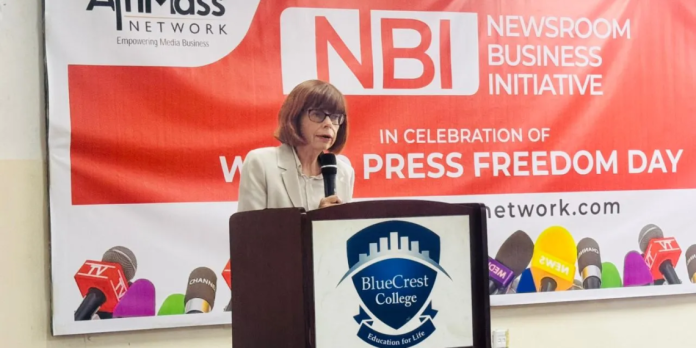Artificial intelligence (AI) is rapidly reshaping the future of journalism, offering new tools for efficiency, but also posing complex ethical and security threats. That was the central message from Australia’s High Commissioner to Ghana, Berenice Owen-Jones, during remarks at the World Press Freedom Day 2025 commemoration in Accra, hosted by AfriMass Network in partnership with Bluecrest University College.
“The fact is that media freedom is diminishing in a record number of countries,” Owen-Jones said, referencing the latest World Press Freedom Index. “Disinformation, propaganda, and artificial intelligence pose mounting threats to journalism.”
Her remarks captured the global anxiety surrounding AI’s growing role in media production and manipulation. As tools like deepfake generators and content bots become more accessible, political actors and state agencies are increasingly using them to distort reality and manipulate public opinion. “AI can be used to spread false or misleading information, increase online hate speech, and support new types of censorship,” she warned.
Owen-Jones stressed that while AI is fueling unprecedented disinformation campaigns, it also holds promise for journalism when used ethically. Technologies such as automated transcription, real-time translation, and content summarization can streamline newsroom operations and free up resources for investigative reporting. For audiences, properly managed AI can personalize access to credible news and enhance public understanding.
“Newsrooms are increasingly fact-checking and developing codes of conduct, this is to be encouraged,” she noted, advocating for internal guidelines and media literacy investment as guardrails against AI misuse.
The High Commissioner also underscored AI’s risks to journalist safety. Some AI-powered tools have been weaponized as spyware, capable of tracking reporters’ movements and communications. These tactics, she said, place journalists, particularly those covering sensitive or political topics, at heightened risk of harassment, arrest, or worse.
Her call to action was clear; governments, media organizations, tech companies, and civil society must work collaboratively to define and enforce ethical standards for AI in journalism. “Access to reliable information has become increasingly important in the age of digitization, fake news, and disinformation campaigns,” she said. “We must ensure AI strengthens, rather than weakens, press freedom.”
As this year’s Press Freedom Day spotlighted AI’s role in the information ecosystem, Owen-Jones’ remarks echoed a growing international consensus; technology alone will not determine journalism’s future. The responsibility rests with how societies choose to govern its use.

